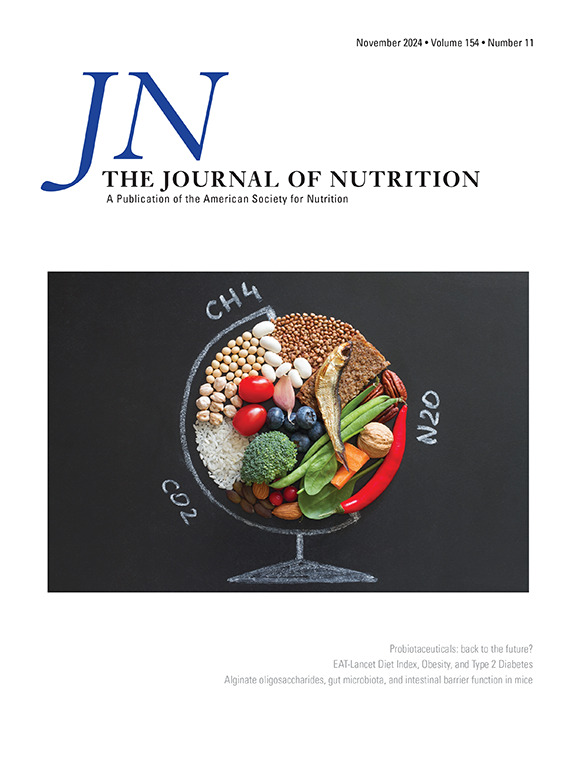Plasma Proteins Associated with the Mediterranean-Dietary Approaches to Stop Hypertension Intervention for Neurodegenerative Delay (MIND) Diet and Incident Dementia
IF 3.7
3区 医学
Q2 NUTRITION & DIETETICS
引用次数: 0
Abstract
Background
The Mediterranean-Dietary Approaches to Stop Hypertension Intervention for Neurodegenerative Delay (MIND) diet slows cognitive decline and protects brain health, but the mechanisms are poorly understood.
Objectives
We aimed to determine the plasma proteins associated with the MIND diet score and their ability to predict incident dementia in the Atherosclerosis Risk in Communities study.
Methods
We analyzed 10,230 Black and White participants at visit 3 (1993–1995) with food frequency questionnaire and proteomics data and randomly divided them into discovery (n = 6850) and replication (n = 3380) samples. We examined associations between the MIND diet score and 4955 proteins using multivariable linear regression and elastic net regression. C-statistics were calculated to assess if proteins improved the prediction of high MIND diet adherence beyond participant characteristics. Cox proportional hazards models were used to assess associations between significant diet-related proteins and incident dementia over 2 decades. C-statistics assessed the ability of significant proteins to improve dementia prediction beyond known risk factors.
Results
Of 316 proteins associated with the MIND diet score in the discovery sample at a false discovery rate <0.05, 62 were internally replicated. Of these, 21 proteins selected by the elastic net individually improved MIND diet score prediction. After a median follow-up of 21 y, there were 2311 dementia cases. Five diet-related proteins, thrombospondin-2 [hazard ratio (HR): 1.19; 95% confidence interval (CI): 1.11, 1.29], protein ABHD14A (HR: 1.23; 95% CI: 1.11, 1.37), structural maintenance of chromosomes protein 3 (HR: 1.19; 95% CI: 1.08, 1.31), epidermal growth factor receptor (HR: 0.68; 95% CI: 0.53, 0.86), and interleukin-12 subunit beta (HR: 1.14; 95% CI: 1.05, 1.25) were significantly associated with incident dementia. All 5 proteins individually and together improved the prediction of dementia risk.
Conclusions
Using high-throughput proteomics, we identified candidate biomarkers of the MIND diet score and incident dementia, which are implicated in neural signaling, angiogenesis, and anti-inflammatory pathways.
血浆蛋白与地中海饮食方法有关,以阻止神经退行性延迟(MIND)饮食和痴呆的高血压干预。
背景:地中海饮食法抑制高血压干预神经退行性延迟(MIND)饮食可延缓认知功能衰退并保护大脑健康,但其机制尚不清楚:我们旨在确定与 MIND 饮食评分相关的血浆蛋白及其预测社区动脉粥样硬化风险研究中痴呆症发病的能力:我们分析了 10,230 名黑人和白人参与者在第 3 次访问(1993-1995 年)中的食物频率问卷和蛋白质组学数据,并将他们随机分为发现样本(n = 6,850 个)和复制样本(n = 3,380 个)。我们使用多变量线性回归和弹性净回归法研究了 MIND 饮食评分与 4,955 种蛋白质之间的关联。我们计算了 C 统计量,以评估蛋白质是否超越了参与者特征而提高了对 MIND 饮食高依从性的预测。Cox 比例危险模型用于评估二十年来与饮食相关的重要蛋白质与痴呆症发病之间的关系。C统计量评估了重要蛋白质在已知风险因素之外改善痴呆症预测的能力:在发现样本中,与MIND饮食评分相关的316种蛋白质的错误发现率小于0.05,其中62种得到了内部复制。在这些蛋白质中,有21种蛋白质被弹性网选中,单独改善了MIND饮食评分预测。中位随访 21 年后,共有 2311 例痴呆症患者。五种与饮食相关的蛋白质:血栓软骨素-2(HR,1.19;95% CI,1.11-1.29)、蛋白质 ABHD14A(HR,1.23;95% CI,1.11-1.37)、染色体结构维持蛋白 3(HR,1.19;95% CI,1.08-1.31)、表皮生长因子受体(HR,0.68;95% CI,0.53-0.86)和白细胞介素-12 亚基 beta(HR,1.14;95% CI,1.05-1.25)与痴呆症的发生显著相关。所有这五种蛋白质单独或共同使用都提高了对痴呆症风险的预测能力:利用高通量蛋白质组学,我们确定了MIND饮食评分和痴呆症发病的候选生物标志物,它们与神经信号转导、血管生成和抗炎通路有关。
本文章由计算机程序翻译,如有差异,请以英文原文为准。
求助全文
约1分钟内获得全文
求助全文
来源期刊

Journal of Nutrition
医学-营养学
CiteScore
7.60
自引率
4.80%
发文量
260
审稿时长
39 days
期刊介绍:
The Journal of Nutrition (JN/J Nutr) publishes peer-reviewed original research papers covering all aspects of experimental nutrition in humans and other animal species; special articles such as reviews and biographies of prominent nutrition scientists; and issues, opinions, and commentaries on controversial issues in nutrition. Supplements are frequently published to provide extended discussion of topics of special interest.
 求助内容:
求助内容: 应助结果提醒方式:
应助结果提醒方式:


